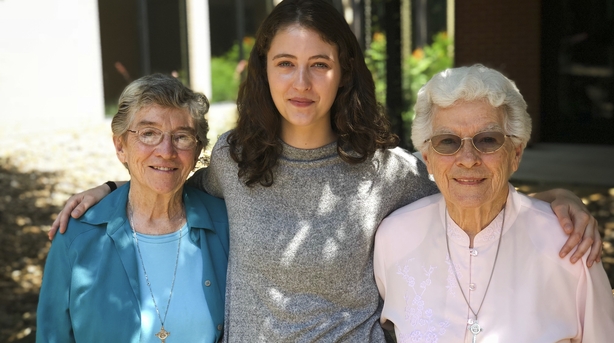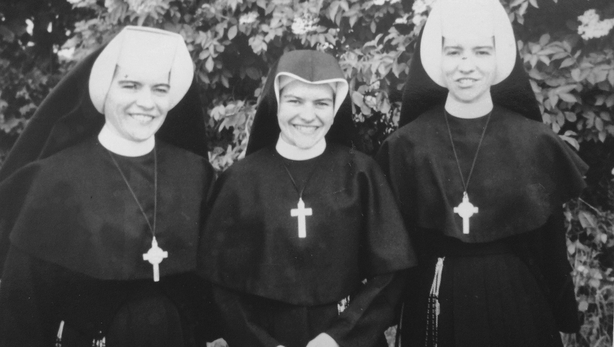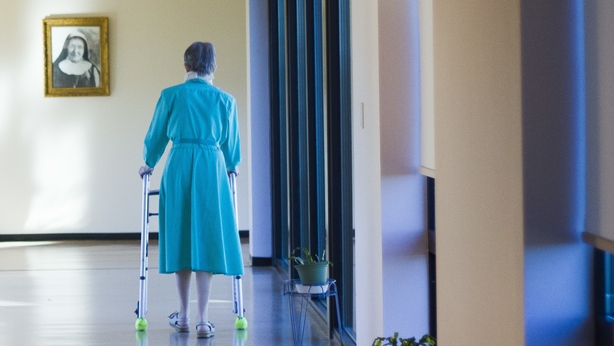It's 1951. Jo Murray is 18 years old and stands at the railing of a westbound transatlantic ship with four other teenage Irish girls. But these aren't just any mid-century Irish immigrants. They're going to Texas, and they're going to become nuns. Now, their grand niece Emma Decker tells their compelling story in her Documentary On One presentation, Sisters - listen to it in full above.
It’s 2015 and I’m in my second year of university, sitting in the kitchen of my parent’s house in Portland, Oregon on holiday break. My dad starts reading a Christmas card aloud to us; it’s from my two grand aunts who are Irish nuns in a convent in San Antonio, Texas.
It started as a hypothetical idea: I was studying journalism at school, and my dad casually suggests that the lives of my two grand aunts would make a great story. Christmas break ends, I return to my studies, and the nuns get put on the backburner. But I couldn’t stop thinking about it.

How did hundreds of young Irish women end up in Texas? And what became of that choice? Three months later, I was on a plane to San Antonio.
My grand aunts, Sisters Jo and Gabrielle Murray of Ballinasloe, Co. Galway, both immigrated to the U.S. in the 1950s at the age of 18 to become nuns. Their convent in Texas was founded in 1888 as the first free private Catholic school for African Americans in the state of Texas.
Made up of mostly Irish immigrants, the nuns in the San Antonio convent became a solid unit that moved through history together. During the Civil Rights Movement of the 1950s and ‘60s, they helped to desegregate schools across the South. Sister Gabrielle spent more than a decade living and working in Mexico, became bilingual, and used her Spanish to do prison ministry with Hispanic inmates upon her return to Texas. Sister Jo spent seven years as a nurse in Zambia.

Many of the women in my grand aunt’s religious community became leaders in their communities and the first in their families to go to university—opportunities that were not always accessible for women during that time.
Today, my grand aunts are ages 80 and 85, and coming to terms with the end of their way of life. The median age of the convent is 77, and there are no new nuns.
After my first trip to Texas in 2015, I spent the next three years living on and off with the nuns in the convent during school breaks, and on trips to Ireland I retraced their steps before immigration. The project did not start off as something I imagined would be published on the radio. At its inception I was 19 years old, a big fan of audio journalism, but had never produced a story of this scale and depth. I saw creating this piece as a good way to hone my skills—at most it might be a keepsake and historical record for my family.
But the deeper I got into my research and interviews, the more I realized the potential this story had. Upon hearing about my side-project with the nuns, one of my professors at the University of Oregon recommended I use the story as the basis
for my senior thesis. Writing a 50-page analytical paper to back up my reporting helped the project blossom. I realized that the story of my grand aunts was not singular to them. It’s threads spanned five generations of mothers and daughters, illustrating how choices domino down generations, and revealing the evolution of my international Irish family and the women who built it.

The story of these nuns in San Antonio is novel because few have had the chance to tell it, and captivating because it is a unique way of life and set of historical incidents. But it also contains universal experiences: leaving home, making choices, and moving on.
Before reporting this story, I had never asked my mom directly why she had immigrated; never wondered what drives someone to become a nun or how a mother feels when they release what little control they have of their child’s future. And maybe my piece will prompt listeners to do the same; what questions haven’t they asked? What choices shaped their lives?
When people ask me about what kind of journalist I want to be, I talk about this project. These are the kinds of stories I want to tell, and the ones that need to be told—of the vanishing, the brave, and the silent forces of history.
Over the past three years, people familiar with this story have often asked me, "Emma, how are your nuns?" My great aunts are resilient, powerful women. They are bastions of justice and pillars of time. I know this is a story that will follow me forever.
Documentary On One: Sisters, RTÉ Radio 1, Saturday, June 23th at 2pm - listen to more gems from the Documentary On One vaults here.

